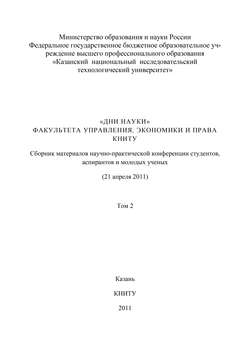Читать книгу «Дни науки» факультета управления, экономики и права КНИТУ. В 3 т. Том 2 - Коллектив авторов - Страница 9
Секция 4.
ПРОБЛЕМЫ И ПЕРСПЕКТИВЫ ИННОВАЦИОННОЙ ЭКОНОМИКИ В РФ И РЕГИОНАХ
Аюпов Р
Оглавлениесоискатель кафедры экономики
Rubin Ayupov
BUILDING CREATIVE ECONOMY
Copyright-based industries are one of the main powers pushing the economy to innovative and technological development. Creative economy is a widely known term first used by John Hawkins. He divided creative economy to fifteen creative industries, the product of these industries is intellectual property. Creative industries nowadays constitute 12 % of the annual GDP in the countries of Western Europe and North America. We consider copyright-based industries as one of the most powerful drivers of national economy, because the rate of economic growth of these industries is four times higher than general economic growth rate.
In the new era of the dominating creative industry creative class takes major social role instead of working class, according to the class theory of sociologist Richard Florida. Russia takes the second place after the USA in the rate of employment in creative industry. Florida also argues that, as globalization makes the world effectively smaller, in the near future there will be 40 mega-regions, within which economic growth will be concentrated.
Within the promotion of creative economy copyright protection must be considered. There are two aspects of protecting copyrights: legislation and law enforcement. In regards to legislation, laws are usually made properly and successfully deliver overall defense to copyrights. Law enforcement, on the other hand, presents more trouble to the defense of copyrights. Punishment for breaking copyrights simply cannot be severe enough to stop copyright violation. Most cases in Russia do not result in a large enough fine to make people respect copyrights. Consequently, there is high level of piracy permeating the multimedia market. According to numbers given by GfK Group Russian multimedia products loses 80 % of its annual profit. For United States the situation is much better; nevertheless, according to the Institute for Policy Innovation, the American economy loses $26 billion every year, due to illegal production and use of multimedia products.
On the other hand, copyrights are admittedly not always good for creative industries. For example, in the filmmaking industry Hollywood doea not dominate the industry as would be expected. Though Hollywood is highest earning institution of the motion picture industry, Nigeria, India and China produce over 75 % movies in the world. Albeit, the quality of these movies is not as good as American, this example makes us doubt the importance of revenue in the creative industry. The artist does not always care about box office numbers as much as he cares about the whole idea of his creation to be delivered properly. One of the most famous artists if the 19th century postimpressionist Vincent Van Gogh didn’t sell any of his paintings, because he never found his work to bear a price. This particular example is one of many for the arts. Countless free performances, charity activities and others serve as example of the artist’s initiative not for his own profit, but for higher ideas. The creative industry highly appreciates the ideological aspects of their production. This is also beneficial for creating the right market image for the product. For example, British rock band Radiohead uploaded their last album to their official web site and let their fans download it for free, leaving the option to donate as much as they wish. As a result "In Rainbows" became the most commercially successful record of the decade, even though customers were allowed not to pay at all. This example is now a role model for countless artists around the world.
Fighting piracy cannot include only more stringent punishments for perpetrators but also other alternatives. Proper price-making policy with more customer involvement and campaigning for the purchase of legal products instead of counterfeit.
Russia is potentially one of the principle countries for the developing the world creative economy. It has high level of creative capabilities among its population.
